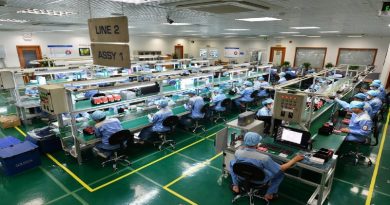Japan shifts investment focus on Vietnam’s service sectors
The current number of Japanese firms in Vietnam’s manufacturing sector has experienced a slowdown, but the number in services and trade sectors has been rising significantly.
Instead of mainly pouring into manufacturing and infrastructure projects as few years ago, Japanese investors have been shifting their focus to services and trade sectors in Vietnam, driven by the market’s growing purchasing power.
According to Tran Nguyen Trung, deputy director of I-Glocal, which is a top-tier company in accounting and tax consulting for Japanese companies in Vietnam, the current number of Japanese firms in Vietnam’s manufacturing sector has experienced a slowdown, but the number in services and trade sectors has been rising significantly.
Trung forecast that this trend will continue in the next few years as the Vietnamese consumption market is very attractive to foreign services and trade companies, including the Japanese ones.
Sharing the same view, Kagoshima Shigeto, marketing director of Acecook Vietnam, said that the Vietnamese market is very attractive and has high growth prospect for development.
As smart supermarkets will thrive in Vietnam in the time to come, this will be an investment trend of many Japanese companies, Shigeto said.
The Japan External Trade Organization (JETRO) also said that Japanese investment in Vietnam was previously channeled mainly to the industrial sector, with giant manufacturers as Toyota, Honda, Canon, and Mitsubishi. However, recently Japanese capital has also been flowing into the service and agricultural sectors.
Consumer goods, services, and real estate sectors have also been the focus of Japanese investment over the last three years, reflecting the growth of Vietnamese purchasing power thanks to the rapid expansion of the country’s middle class.
Japan’s AEON, one of the world’s biggest retailers, for example, began investment in Vietnam in 2013 and currently has six trade centers in the country. Iwamura Yasutsugu, general director of AEON Mall, said AEON will increase the number of its trade centers in Vietnam to 20 by 2025.
Besides AEON, some of the top names in the Japanese retail industry have so far joined the Vietnamese market, including 7-Eleven, MiniStop and FamilyMart.
Quality improvement
According to industry insiders, the presence of many big names in the Japanese retail industry in Vietnam showed that Japanese investors want to gradually take a bigger slice of market share in the potential outlet.
Vietnam has become an attractive market for Japanese retailers following the popularity of Japanese goods in the domestic market thanks to the high quality reputation established over the time.
Japan is the only country which businesses operate in three retail channels in Vietnam – supermarkets, shopping malls, and convenience stores – with the number of convenience stores growing strongly and reaching some 1,000 in 2017.
This trend is reflected in JETRO’s annual survey on the business activities of Japan-affiliated companies in Asia and Oceania in recent years. Accordingly, the number of Japanese-invested projects in the hotel, food, and beverage industries were the double of that of the previous year, while distribution and retail rose by 19.2 percent.
Assessing the new trend of Japanese investors in Vietnam, Luong Van Khoi, deputy director of the Ministry of Planning and Investment’s National Center for Socio-Economic Information and Forecast (NCIF), said Japanese investors’ shifting investment to Vietnam’s service and agricultural sectors will create opportunities to develop high-quality service industries.
However, to take advantage of this new Japanese investment trend, economic experts suggest that the government of Vietnam should adopt specific policies to further Japanese investment in those fields, especially in high-tech agriculture – an area in which Vietnam is highly interested in and which it has given priority for development, Khoi said.
Source: hanoitimes.vn










